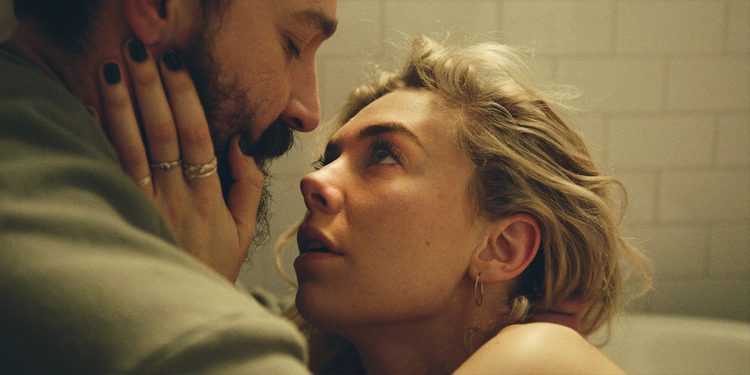In a way, Kornél Mundruczó’s “Pieces of a Woman” feels doomed by its own title – a film that works better in pieces and moments, than it does as a sustained narrative. The film’s opening title comes thirty minutes into the film, after a sequence of events that feel exhausting but thrilling to watch. That first quarter of the film is its best, and it’s likely to attain the bulk of the attention when the film premieres to audiences.
In those first thirty minutes, Mundruczó and his partner (professionally and personally) Kata Wéber quickly map out the stakes of this story, suggesting a wealth of information and context in the lives of its characters. Martha and Sean are a couple expecting a child. There’s a clear class disconnect between them, as early on Sean grumbles about Martha’s smothering mother who seems to gently resent her son-in-law’s working-class status. But, despite the underlying issues, all seem excited for the new baby. But the excitement and hope are interrupted when a home birth goes very wrong in the film’s opening sequence. Benjamin Loeb’s camera darts through the room as it tracks the entire birth sequence in a long-take that feels confident, sharp, earnest and provocative. The rest of the film covers the couple’s recovery from that tragedy, and the more time we spend with the couple and their family the more “Pieces of a Woman” becomes unfocused.
Grief is something we all experience, but it is not something that is always easy to present and the middle sequence of the film immediately compromises itself in trying to externalise the mostly internal struggle that the couple is experiencing. The parts are there – Martha begins to pull away from the people around her, while Sean feels spurned by her coldness and retreats into his own world. And Martha’s mother, Elizabeth, seems committed to making the couple confront the situation in ways that feel unhelpful. The scenario could work, but “Pieces of a Woman” does not know how to put them together.

Vanessa Kirby and Shia LaBeouf make for an appealingly mismatched couple. She is all sleek refinement. He is all restless, woodsy energy. The clash of their disposition makes the opening work, but Mundruczó and Wéber abandon the potential of that interaction as the story goes on and it’s odd that in a film about a grieving couple, the story is at its weakest in excavating their relationship. In the opening sequence, Sean complains about Elizabeth’s dislike of him. Even the car she buys for the couple in preparation for the birth feels like away to undercut Sean, a construction worker who is at odds with the air of class that Elizabeth seems to feign. The class implications of the couple feel like a striking keynote for the film to excavate, but Mundruczó and Wéber reveal an oddly limited stance on class clashes especially in the way the film ultimately ends the arc – in a late-film plot development that feels particularly weak.
In theory, the loss of a baby would prompt a two-hander drama where a couple must learn to live with themselves but “Pieces of a Woman” straddles a number of oppositional genres. Elizabeth is committed to getting justice for her lost grandchild, and the film commits to a courtroom drama as Martha’s attorney seeks to prosecute the potentially culpable midwife. The domestic drama lens also moves from Sean and Martha as the second-half commits to fleshing out Elizabeth’s relationship with her daughter, in a sequence of events that lacks subtlety. Ellen Burstyn, for all her commitment, cannot make an effortful monologue in the final act feel organic as part of a bid to explain character motivations.
For all the emotion at work, the film cannot quite modulate itself between its stories or its performers. Vanessa Kirby won the Volpi Cup for Best Actress at Venice for her work earlier in the month, but LaBeouf is more compelling, especially because he’s doing more with an incredibly flat character arc. It’s a restlessly unpredictable performance that promises something more potent in moments where his grief is unfurled in animalistic ways. And Kirby’s iciness is best opposite him, making us understand what might have attracted them to each other ultimately. Elsewhere, though, Kirby isn’t able to make the film’s presentation of Martha as a cipher organic. The film reaches its climax in a courtroom monologue that feels too melodramatic to match the film. It works in isolation, but cannot connect with the rest of the film. A final sequence, set some time in the future, is even worse.
The sincerity of emotion is never uncertain, but “Pieces of a Woman” struggles to feel genuine after those first 30 minutes. The more it goes on, the more frustrating its superficiality becomes. Instead of excavating the potential for drama, it builds roadblocks for them that feel perfunctory and take the story away from where it should be – in the intimacy of the couple at its centre. By the end, its indecisiveness feels more frustrating than illuminating.
“Pieces of a Woman” was a Gala Presentation at the 2020 Toronto International Film Festival, where it was acquired for distribution by Netflix.





